Welcome to the first blog of our series. We embarked on a powerful and heartfelt journey as The Woman Boss team, in collaboration with UNICEF, to rural Gambia. Our mission was to inspire and empower women and young girls through leadership, politics, hygiene & etiquette, period poverty and gender-based violence workshops. Over the course of a month, we set out to make a difference in the lives of women and girls in the Central River Region (CRR) and North Bank Region (NBR). In addition, we conducted leadership and political participation training in Mansa Konko (LRR), Janjanbureh (CRR), and Basse (URR). This blog focuses on our training -empowering women in politics, while highlighting the other remarkable activities that took place during our transformative journey.
In a country where women are underrepresented in decision-making positions, The Woman Boss recognized the urgent need to encourage and support women’s political participation. Our leadership training sessions in Mansa Konko, Janjanbureh, and Basse played a pivotal role in empowering and inspiring the women participants, equipping them with the necessary skills and confidence to thrive in leadership roles. We nurtured their leadership potential and encouraged active engagement in shaping the future of their communities.
Our sessions were attended by women of diverse backgrounds and ages. it consisted of women in politics, women trying to get into politics yet failing every time, other community development groups and an exceptional group known as the Mothers Club, which comprised of the respected mothers of the community. The Mothers Club, as the name suggests, focused on supporting and uplifting each other and the young girls in their communities while fighting against gender-based violence. This group exists in all the regions we visited. They are truly what I would call your sister’s keeper team.
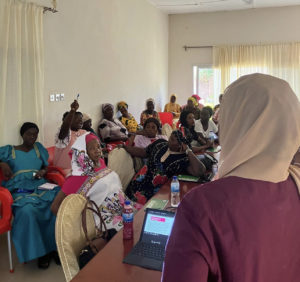
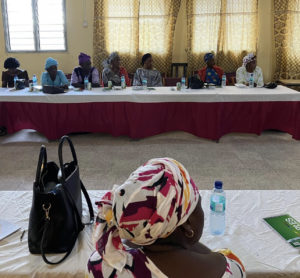
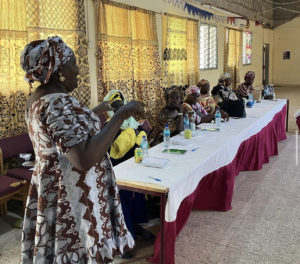
We could not have been presented with a better opportunity, to dig deep into the root of why women in rural Gambia are left behind in the political growth of the country.
Here is what was discovered. These women were aware of the importance of their engagement in politics. The topic we came to discuss was not new to them. In their voices we heard what was stopping them.
Our women are plagued by insecurities, lack of education, self-doubt, confidence, and support. Their sense of support for each other as women was weak and the limitation set by the patriarchal society. Their sense of loyalty to their political party makes them overlook the incompetency and negligence of their needs.
The Women expressed their frustration with party leaders who refuse to accommodate or nominate women candidates to represent their parties. And highlighted instances where they were denied opportunities to lead or were overlooked for important positions within political parties. They believed that their resistance to women’s leadership was a deliberate attempt to prevent them from taking on influential roles and contributing to decision-making processes. They were simply tired of dancing and clapping for political leaders while their voices and cries were not heard.
The impact of our leadership training sessions was profound, as women participants exhibited increased confidence and motivation. Through interactive exercises, they gained a deeper understanding of effective leadership practices, communication strategies, and problem-solving techniques. Our supportive and inclusive environment fostered open discussions, allowing women council members, nominated council members, and aspiring candidates to share their experiences, challenges, and successes. These discussions shed light on the existing barriers and biases faced by women in politics, emphasizing the importance of creating a more inclusive and supportive political landscape.
During our sessions, nominated council members candidly highlighted the additional challenges contributing to their underrepresentation in politics. These challenges ranged from a lack of support, and financial constraints. These valuable insights highlighted the need for alternative pathways to leadership and the necessity of support and recognition from party executives. The discussions underscored the existing barriers and biases within political parties and reinforced the importance of creating an inclusive and empowering environment for aspiring women leaders.
Conclusion: Our journey to rural Gambia was a transformative experience, filled with both hope and heartache. We witnessed the struggles and aspirations of women and young girls in these marginalized communities, propelling us to act. The empowering women in politics training sessions provided women with the confidence, skills, and support necessary to overcome barriers and participate actively in decision-making processes. Through engaging discussions, we gained invaluable insights into the challenges faced by women in politics and the importance of creating a more inclusive and supportive environment.
In the upcoming blogs of this series, we will delve deeper into the other aspects of our journey, including the workshops on leadership, etiquette, and gender-based violence, as well as the distribution of menstrual hygiene products. Join us as we share more poignant stories that illuminate the incredible resilience and potential of the women and girls we encountered during our journey in rural Gambia. Together, let us champion their empowerment and work towards a brighter future.
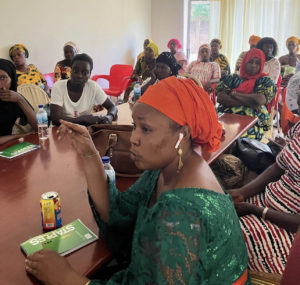

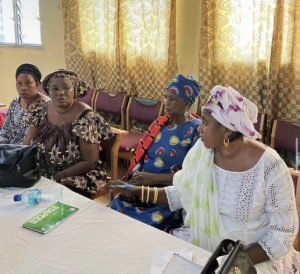
Ajie Isatou Nyan - Executive AssistantTo giving each other the push we need to be vulnerable, strong, and worthy.